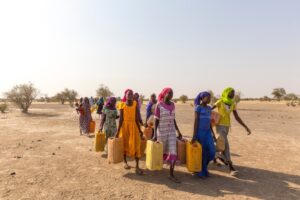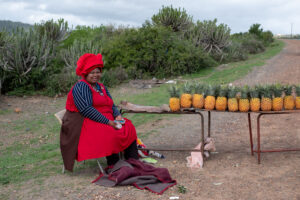Every year since 1995, countries and experts gather to discuss the state of climate change caused by human activities and assess progress made by each state on global greenhouse gas emission reduction at the Conference of Parties (COP) under the UN Framework Convention on Climate Change (UNFCCC). Greenhouse gases are responsible for climate change, also called global warming.
UNFCCC entered into force in 1994, and the first COP took place in 1995. Late last year, COP 27 was held in Egypt’s tourist resort city of Sharm el Sheikh, where a historic decision on a Loss and Damage Fund was reached. It has taken 30 years of advocacy by Small Island States and climate justice activists from the Majority of the World to pressure countries to agree to this Fund, even as the effects of climate change increasingly affect the majority and are caused by actions of historical emitters.
The COP is an important space for feminist influencing, organizing and advocacy towards demanding a just and equitable transition from the use of fossil fuels. This is critical as the Majority of the World needs to industrialize through renewables. While countries in the ‘Global South’ have minerals that are important to technologies for industrialization, they don’t always have the technology. These countries also lack adequate financing to address, minimize and avert the effects of the climate crisis, which often results in loss of lives and infrastructure and lost development opportunities.
Last year, feminists gathered at events like the African Feminist Academy for Climate Justice and the Feminist COP. These events were convened by African women and girls, bringing communities and women’s rights organizations together to co-create ecofeminist demands ahead of COP 27. The African Feminist Taskforce further led the demands for climate justice for the women and girls of Africa at COP 27 through the Women and Gender Constituency.
As we head to COP28 to be hosted in Dubai from November 30 to December 12 2023, we need to critically think through structural and political framing of the effects of the climate crisis on the most vulnerable and how feminist advocacy can further spur action and decisions on financing. Three key issues stand out: representation, climate finance and hypocrisy of historical emitters.

Representation
Out of 112 world leaders who attended COP 27, only 12 of them were women. Overall 34% of 35,000 participants were women, an improvement based on previous years, but remains inadequate. Frontline communities currently experiencing the worst effects of the climate crisis may have been at COP 27, but their numbers are not known as participant data is not disaggregated to show this.
While the COP negotiations are technical and diplomatic spaces, which only state parties have full access to, there are many alternative spaces within COP where communities can contribute to ideating and shaping understanding of human impacts of the climate crisis and local responses. States must also fully consult these communities to bring their needs and concerns as priorities within state positions.
Access to COP meetings continues to be hampered by systemic immigration injustices like visa regimes for many Africans, which are expensive and lengthy. Even when one is registered and accredited by the UNFCCC to attend, the very venue of the talks remains far from affordable, from costly accommodation to logistics, to participate in the two-week-long negotiations fully.
The context of host countries also matters a lot and determines if marginalised groups can fully hold protests and demonstrations. Egypt’s restricted civic space proved a challenge, and the upcoming hosts will also tell how this expression can be upheld.
During COP, state parties, through designated representatives, usually discuss and negotiate climate commitments and ambitions, which they make in Nationally Determined Contributions as prescribed by the Paris Agreement of the UN Framework Convention on Climate Change. They further come up with positions on thematic areas. CSOs and other organizations, called constituencies, have some access to negotiations but remain limited.
During the COP 27 negotiations, representatives of CSOs, feminist and women’s rights organizations were too few to identify critical gaps and opportunities and provide structural understanding of the issues being raised by states, identify ‘allies’ and ‘enemies’, and provide recommendations for action. Adequate and meaningful participation by CSOs, women and communities at the frontlines of the crisis is important to hold these processes accountable.
Climate Finance
When parties agreed to the Paris Agreement, there was a promise that developed states, many of whom are historical emitters, would mobilize $100 billion annually by 2020 to fund adaptation and mitigation actions. To date, only a percentage of this has been provided. Many less industrialised countries have rightly refused to commit to any financing. Currently, Africa is only responsible for 4% of global greenhouse gas emissions and negligible historical emissions. Three significant climate finance discussions held at COP 27 were about: the New Collective Quantified Goal on Climate Finance; Adaptation Finance, and The Loss and Damage Fund.
The New Collective Quantified Goal on Climate Finance: In prior COP discussions, it was agreed that the already committed goal of mobilizing USD 100 billion per year from 2015 until 2020 was unclear, thus the need for a new, more precise goal that identifies the contributions of all actors and sectors. It is worth noting that the finance goal has not been met, and there isn’t a clear plan to deliver this commitment and no mechanism for tracking finance yet. There is limited community engagement in developing this new goal. Women’s economic and non-economic contributions should be considered when creating this goal, and southern voices should be heard.
On Adaptation Finance: At COP26 in Glasgow, parties agreed to double adaptation finance by 2025, a milestone towards improving financial flows to climate-vulnerable communities, especially women. Adaptation refers to “adjustments in ecological, social or economic systems in response to actual or expected climatic stimuli and their effects”. These adjustments are important for the resilience building of whole communities and sectors. At COP27, it was disappointing that no delivery plan was agreed upon. This year, much attention will be paid to whether the financial pledges will be fulfilled, accessible and localised.
The Loss and Damage Fund: Non-economic losses and damages faced by women and marginalised communities as a result of the effects of the climate crisis are not yet quantified, and the people who experience these losses and damages are not substantively involved in developing this fund for it to be responsive to their needs. These losses are linked to the disrupted or affected unique relationships and livelihoods women draw from natural resources and indirect effects through care work that is unpaid should their families be affected. As we head to COP 28, we must look out to ensure recommendations on this fund prioritize appropriate needs and timelines.
The truth is that, with the mounting debt that ‘Global South’ countries face, the frequent severe climate disasters and the post-pandemic inflation, people disproportionately affected by the climate crisis may not be reached on time. This means they will fall back developmentally and be predisposed to more significant challenges.

Hypocrisy and False Solutions
A new study published in the Journal of Climatic Change estimates that the US, the largest historical emitter, has spent 3.4 billion over the last ten years on public relations campaigns around fossil fuels. This is more than the USD 1 billion allocated to the Adaptation fund since 2007 when the fund became operational. The irony is there was a lot of pushback on the loss and damage finance facility from the US and discussions of the Adaptation Fund board. Instead, the US committed USD 24 million to Global Shield, an insurance facility for vulnerable populations. Organizations have pointed out that the insurance solution could be more problematic as, for instance, one must make non-refundable payments (premiums). In the agricultural sector, insurance usually serves landowners due to skewed land tenure systems in many countries. It is considered a false solution that exploits women’s labour, mostly smallholder farmers. Further, the solution aligns differently with the expectations of a climate finance portfolio that serves more adaptation than mitigation goals and one that is grants-based.
At COP 27, a Plant-Based Treaty was fronted by several campaigners that pushed for vegan living. Women, girls and marginalised communities facing food availability and affordability challenges do not have a say regarding what to eat. This treaty is a northern-facing solution that, in context is still insensitive to food-insecure populations across the world.
Many European countries are maintaining hold of fossil fuels while calling on the least industrialised countries to move to renewable energy. They are still providing fossil fuel subsidies to fossil fuel companies to meet growing energy demands and dwindling supplies. In the aftermath of COP 27, it has emerged that Europe had increased importation of coal from different countries in Africa, including 70pc of the coal from South Africa. The UK recently commissioned a coal mine, and coal use has increased significantly since the war in Ukraine began.
Carbon markets have for a while been fronted as a fiscal enabler for the private sector as well as funding for the public sector. They are problematic trading systems that allow the selling and buying of credit equivalent to greenhouse gas emission reduction. Primarily voluntary, the trading system is growing, and during COP 27, several decisions on Article 6 of the Paris Agreement that created a global governance mechanism for this were taken. Carbon markets are a false solution as they place the burden of mitigating climate change away from the biggest polluters. Carbon credits are never commensurate with the effects arising from the trade-off and ensure the continued use of fossil fuels by the wealthy.
Next Negotiations
The United Arab Emirates (UAE) is poised to host the next round of negotiations. The COP President, Sultan Al Jaber, is the CEO of UAE’s national oil company (ADNOC) and Minister for Industry. The country has fast industrialised through the expansion of oil exploration. This will be the first time an oil executive is the president of the COP, and there is deep-seated anxiety about what this will mean for the presidential mandate of raising climate ambition. Many state parties, CSOs and other representatives have called for a boycott of COP28 and others for Sultan Al Jaber to step aside.
Over the years, oil lobbyists have increased their pressure on climate negotiations. The language on ‘phasing down’ instead of ‘phasing out’ use of fossil fuels remains critical to the climate struggle.
The climate crisis is a man-made crisis threatening our economies at a scale previously not imagined, pushing those disproportionately affected to the brink. Those responsible for the crisis should fully commit to actions that yield climate justice for the affected across the globe. An ecofeminist ethic that centres care, ecological justice and the well-being of women and nature should guide the response to the greatest crisis of our time.
Anne Songole is a climate justice advocate whose feminism is anchored on ecofeminist ideals and principles that frame emancipation of the environment and that of women and the most vulnerable as similar struggles with similar outcomes. She has experience in social service provision, policy development, energy and climate justice advocacy across Africa.

Really informative and i agree that the African Feminist Academy for Climate Justice and the Feminist COP are important events for co-creating ecofeminist demands ahead of COPs. Hope similar events will be held ahead of COP28